#makoto naegi
Explore tagged Tumblr posts
Text
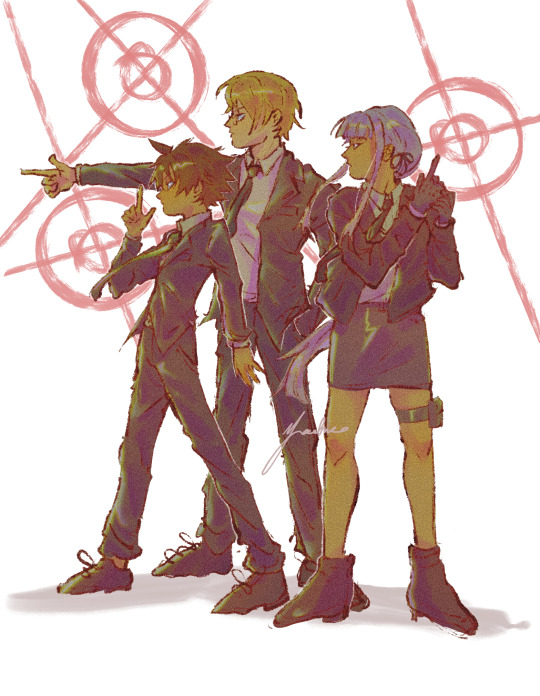
The baddies omgggg
#the best poly in the game#I forgot my caption#danganronpa#dr3#danganronpa 3#makoto naegi#kyoko kirigiri#byakuya togami#naegamigiri#naegirigami#this is for the 3 users on this site who likes them I love them too#myart
4K notes
·
View notes
Text
Me and Makoto <3


the kisserssssss the loverssssss
6K notes
·
View notes
Text

>:Р
137 notes
·
View notes
Text
no one:
the exquisitely helpful makoto every time his influence drops to 0 during a trial and everyone votes to eliminate him immediately without even a hint of remorse:

216 notes
·
View notes
Text
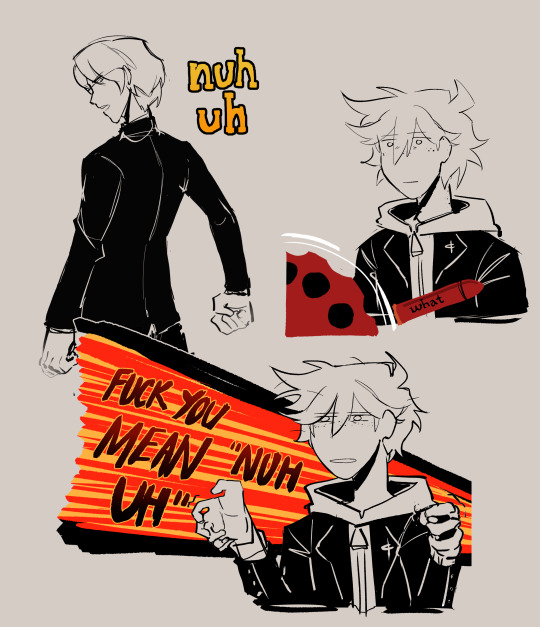
ive_never_seen_that_rope_before_in_my_life.mp3
7K notes
·
View notes
Text

place your bets everypony one
#danganronpa#danganronpa trigger happy havoc#danganronpa thh#drthh#makoto naegi#my little pony#princess celestia#so nice of makoto to get her a treat
71 notes
·
View notes
Note
do you have any favorite or standout things in the japanese version of dr2 that doesn't get translated properly/at all into the english version? anything from jokes to speech quirks or differences in characterization. anything at all! i'm just super curious about the differences so i want to give you an opportunity to ramble.
Thank you, anon! I'm sorry this too so long. I've been busy and I had many different things I wanted to share.
I'm sure there's gonna be a lot of stuff I'll miss...I'll just tell you what's on my mind.
Well, firstly, I'd say what I lament most always is how everyone's speech patterns got largely phased out. You see it here and there still with Souda and Owari - occasionally they try to keep the urban accent. Komaeda's filler words got removed, as already discussed. Really, everyone had something unique to them that got removed, and that makes me so sad! Granted, I understand some of it can be quite tricky.
For example, Mioda is a big one. Remember in the NISA translation, she always refers to herself in third person? This is a somewhat clunky translation. Mioda does call herself "Ibuki", but in Japanese, this isn't as weird, and is seen as a sort of cutesy thing. You can pull it off if you're a young/cute woman.
Mioda also calls everyone first name-chan, making her appear childish/quirky.
She also ends her sentences with っす ssu, which is a version of です desu. This makes Mioda, technically, one of the few Danganronpa characters to use keigo speech, although it's so quirky/casual I wonder if it counts...
Souda also uses keigo, but only when talking to Sonia. He calls her Sonia-san, which got translated as "Miss Sonia" (great translation choice btw!) and is the only character he uses honorifics for - well, typically. There is a part in chapter 5 where Souda calls Hinata "Hinata-chan" to tease him, and it's so cute to me xD
By the way, I don't talk about V3 much, but I know there's contention with how they translate Gonta. From what I've seen of V3, the thing that sticks out about Gonta is he, too, uses his first name as his pronoun. I believe the ENG version went with a Tarzan-esque choice of translation, but the joke in the JP version, I believe, was - as said - first person self-pronoun is reserved for young, cute girls...Gonta neither looking like either.
Most of all I lament Hinata's speech...he sounds so similar to Naegi in English, which is a shame, as he was meant to be Naegi's opposite. In Japanese they're night and day, and Hinata really loses that bite he had in the NISA version. It's what makes me sad most :(
On the game itself, there's a joke I think about a lot, that (understandably) loses it's meaning in English. It's in Tanaka's freetime event.


I have no issue with the translation itself. It's sadly just a joke that's lost in English as things are.
It's in the word kotodama. Kotodama refers to the idea that words hold spiritual power. Like a spell, or something. The joke here is Hinata...actually is a kotodama user. Literally.
In JP Danganronpa, truth bullets are called...kotodama. It's a cute little meta joke.
On the flip side, here is a translation I do take issue with:




I understand how they made this error, but it's still a little shocking to me.
First, let's look at context. Context is important in any language, but in Japanese especially. The context is this: Komaeda has a dramatic buildup, talking about how it's time he's gotten a little good luck, that now he can finally say it, and then dramatically pauses after saying Hinata's name...
Let's not be naive. This reads like the buildup to a love confession.
And then, Komaeda just asks, "Can you be my friend?"
It's a wonderful scene. Perfectly captures Komaeda's life in that asking just to be friends requires this much forethought, and it's wonderfully hilarious at the same time. Very Danganronpa, isn't it? Makes you think about the character, gives you some emotion, but also makes you laugh.
I digress. Now that we have context, let's examine Hinata's response.
First he goes, "What?" or え?in Japanese.
Then he says: ああ...なんだ。
"Ah...oh, that's it?" is a fine way to put it here. Literally speaking, the line basically reads: Oh...what? but なんだ is used as a sort of emotional signifier. The words are failing me right now but here are some examples of how なんだ could be translated when used like this:
"What the hell. Okay."
"Jeez, really?"
"That's crazy!" (in response to a story or suchlike)
Does this make sense? It expresses disbelief, shock, surprise, irritation...stuff like that.
So "Oh...that's it?" is good in this context. Clearly, Hinata also expected Komaeda to say something more heavy.
It's the last line that bugs me.
"So that was all just for fun..." is not how I would put it at all. I see how they got that, but I don't know why they didn't realize it sounds super odd. I will break it down.
...そんなことで、よかったのか... ...sonna koto de, yokatta noka...
そんな means "that" or "those", as in "that person" or "those books", etc.
こと means thing, but usually is abstract for an idea. It's a bit hard to explain, but think of it like the English word "it". You say stuff like "it's cool" when someone screws up. "it" represents an abstract idea: referring to the accident a person just made. Instead of repeating that all, you condense the idea down into the word "it". Very similar.
で is a particle that marks "direction" here. All you need to know is that here it's saying "everything that comes before me is what the words after me are referring to".
よかった, literally speaking, is the past form of "good". This is a very flexible word, and we will come back to it.
のか is some sentence ending particles. Again, we will come back to this.
Strictly and literally speaking, the sentence goes:
In response to those words you just said, it was good...
The issue that occurred here is how they read よかったのか. They took よかった to literally be the past tense of good (fun), and のか to be questioning in tone. These are both correct ways to read these individual words, but not in this context I think. It's how we got:
So that was all just for fun...
But I think it's obvious よかった is supposed to be read as it most commonly is in this past-form: an expression of relief/happiness, while のか is supposed to be more monologue-ish.
I emphatically think the line should be read as:
Oh, thank God that was it...
I think it's pretty obvious Hinata is rejoicing that Komaeda, in fact, was not going to suddenly dump something like a love confession on him out of the blue.
Sorry that was a longer one. I don't know how many of you care to hear the in-depth technical talk of how it got mistranslated. Usually I just provide my translation, but I know some people out there probably like the explanations. (I also get a little embarrassed because I often run in circles worrying I'm getting stuff wrong myself....and the fact I'm aware I suck at words. I'm just writing how I read it, and putting it in a way that makes sense to me. I'm always open to discussion if you are a beginner speaker or a native and anything between.)
OK, moving on...I want to talk about Owari's island mode ending. Not because it was translated badly per se, but because it hinges on an element that's impossible to translate. To be fair, the team did their absolute best with it.


Owari never talks about wanting to talk more "girly" outright in the Japanese version. Rather, this is what the line (plus the last as it is part of the sentence) reads literally:
OWARI: So, would it be weird if...I started using a-atashi for myself?
Through the whole game, Owari talks in a very rough manner. She uses オレ(ore) to refer to herself, which is a very masculine pronoun. The Katakana script makes it even more rough. I believe in SDR2, only Souda and Kuzuryuu also use this pronoun/script combo (I can never remember if Monokuma uses オレ or ボク).
However in the Island Mode ending, Owari wonders if it'd be weird if someone like her uses あたし(atashi) for herself. By contrast, "atashi" is at the complete opposite end of the spectrum. It is a very feminine pronoun, and would be a complete 180 from ore.
It is also written in Hiragana, further lending it to be "feminine" and "soft".
So the translation change to her saying she wishes to speak more girly is pretty apt. I dunno if there would be a better way to do this. It's very difficult.
Speaking of Owari and pronouns, her pronoun changes again when she catches the despair disease.

When she has the coward's disease, Owari no longer uses オレ(ore), but instead 私(watashi). This is considered a rather basic/default casual pronoun for women, but it is exceedingly more polite/feminine than what Owari normally uses. Coming from her also, Kanji is a very odd script choice, almost opposite to Katakana.
She also never uses honorifics for people, but while sick, she calls Nidai "Nidai-kun" 弐大君. It's sad this detail, unlike in Island Mode, did not get translated whatsoever.
If I'm on the topic, I might as well talk about some other script changes that weren't translated into English well (or at all).
Remember fake Naegi in Ch.6? Well, I always thought this part was strange:



To me, nothing Naegi is saying warrants Sonia to respond in such a manner. Bryce Papenbrook's delivery of the line doesn't make Naegi yell or anything, either.
But this line makes a whole lot more sense in Japanese.


Fun fact, I'm getting these screenshots from a (mostly silent) let's play by a Japanese channel. The let's player almost never talks, but during the first screenshot, he let's out a questioning "Hm?" and then the second, he chuckles and says, "What's with this sudden sharp turn, man?"
That's because in this scene, Naegi completely changes the way he talks. I've talked about it before, but to reiterate: Naegi talks in a very mild way. He's casual, but he never uses any masculine particles, or employs the imperative form.
However, in the first screenshot, Naegi ends his sentence in ぞ, which is a masculine sentence ender (Hinata uses it). Then in the second one, he uses やろう, which is a very rough/derogatory way to say "you guy(s)".
Anybody who's played DR1 would instantly know something is wrong, since Naegi never speaks like this.
To be honest, it could've easily been translated as making Naegi swear at them, since Naegi doesn't swear a lot - certainly if you had him use "fuck", it would have achieved the same effect.
Next, Twogami's final free time event is full of quirky things that get translated a little poorly.
Firstly, there's this line from Hinata:


While not a mistranslation on a technical level, I feel like it sort of misses a joke here.
Twogami asks Hinata if he likes him (好き). In Japanese, 好き is often used to declare your (romantic) love to someone, or ask someone if they love you. I think then Hinata's answer being "I don't hate you" is him skirting around saying "I like (love) you" to not sound like he's confessing his love, or something.
Then, there's this:


Much like we've seen before, this line makes more sense in the context of Japanese.
Since Twogami is impersonating Togami, he speaks like him, too. And when Togami refers to others (the "you" pronoun, as there are multiple in Japanese), he uses お前(omae). This is very masculine and pretty rude.
However, in this scene, Twogami suddenly calls Hinata キミ(kimi), which is much softer and warmer. Hinata picks up on that, but in English, it comes across a little weird, because what exactly is Hinata picking up on in the English version, then?




HINATA: But you've got to stop using "kimi", it's making me sheepish. And besides...the you I know has always called me by "omae".
Here's a literal translation for you, to illustrate this scene better. I don't know why they cut out the part where Hinata directly tells Twogami to stop calling him キミ because it makes him flustered (very cute by the way), but I feel there was probably a better way to go about this anyhow...
I understand it's a very tricky thing to translate since both キミ and お前 mean "you" in English, but surely there was some better way to word it...
I'd have Twogami talk to Hinata more friendly-like, and have Hinata say "The Togami I know has always been a bit mean to me" - or suchlike.
Moving away from scripts but sticking to Freetime events, here's a mistranslation from one of Saionji's:




There's one big issue in both of these that changes the meaning of the scene entirely. Firstly, 人好し means more than "kind-hearted" - it comes with the impression that the person is easily exploitable for their kindness.
Likewise, 勝手に言って is more than "I don't care" - I think they got that because it literally translates as "say what you want", but it's used as a sort of angry statement. See, it literally translates as "speak as you'd like", but 勝手に is usually used to show that someone will do something in spite of anyone else's wishes. So, really, the phrase means "say whatever you want jerk, I know I can't stop you".
I'd write this scene as:
SAIONJI: You're a really big pushover, mister. Well...I guess that's good for me. HINATA: No one fucking asked.
(I would assume Hinata is doing the equivalent of swearing, as he is using an already antagonistic phrase + imperative form + よ).
Also, if you're wondering...while "say what you want" is a valid English phrase, I feel it doesn't really work here...? Though that's how 勝手に言って translates, the phrase focuses more on the disrespectful aspect of speaking out of turn. I feel "nobody asked" is then more accurate.


This line is also interesting. It's not a mistranslation, but I'm just interested in the Japanese text, because I don't think Hinata's ever replaced ない (nai) with ねー (nee) before? It's a sort of urban accent - Owari, Kuzuryuu, and Souda all have it. It makes you sound rougher.
Like instead of "Jyanai yo" ("that's not it") you say, "jyanee yo" ("Tha's not it") <- I'm unsure how to convey an Urban accent...
"Hell no", then, is actually quite appropriate since it is rougher-sounding (meaner). But it interests me since Hinata's never (?) used this accent before. I guess he was so pissed off he didn't even think about it.
Actually, because of the nature of Saionji's talent and fixation on her home country, her Island mode and FTE is full of references to Japanese culture that doesn't get translated well. It's a tough spot to be in - do you not translate it for the sake of staying accurate to the Japanese culture, and let the Western players stay confused, or do you change it to something more understandable, but lose that nuance? I think it depends case-by-case on what's decided.
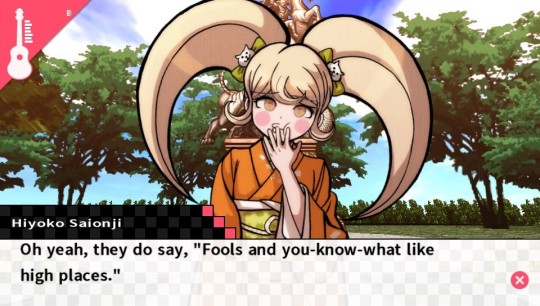
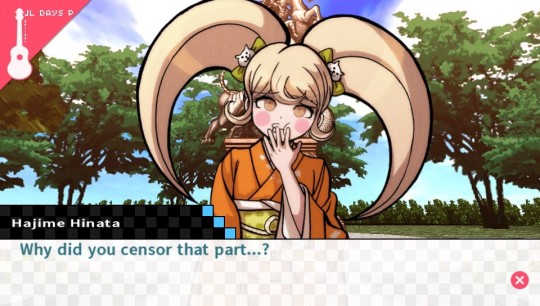
I sadly don't have a screen cap of the JP text, but I do have it from the game's files, so I'll write it down here:
SAIONJI: あー、馬鹿とナントカは高いところが好きって言うもんね。 HINATA: そっちを伏せるのかよ…
This is a Japanese saying, the full saying being 馬鹿と煙は高いところが好き - "Idiots and smoke like high places". It refers to people who foolishly advance "higher and higher" without thoughts of the consequences (when they come crashing down).
This saying though gets often changed to "idiots and so-and-so like high places".
I don't really agree with the English translation because "you-know-what" sounds...sexual? To me, at least. While there is nothing sexual about the original phrase whatsoever. The reason it gets "censored" to ナントカ (nantoka, literally the quotation marker とか with the word "what/something", making it "that 'something'") is unknown to me, but the phrase with ナントカ instead of 煙 is pretty popular especially in spoken Japanese. I think it literally just has to do with the fact that "baka to nantoka" flows out the mouth easier than "baka to kemuri", and isn't because of actual censorship.
Hinata's response then may be to Saionji specifically or in general. Either he's A) asking why Saionji bothers to censor the second part (implying he's never heard the abbreviated version before) or B) he's wondering to himself why people bother to censor the second part in general (implying he is well aware of the abbreviated version).
So, the convo may actually look something like:
SAIONJI: Oh well, as they say: "Idiots and so-and-so like high places!" HINATA: I wonder why that's the part that gets skipped over...
I think this is more plausible. It really has nothing to do with Saionji in particular.
Actually, if you'll recall from earlier in this post with the Komaeda Island Mode ending, we touched on のか, and Hinata is using it again here. Funnily, if we go with my translation, then they ran into the same issue with Komaeda. They read のか in the same erroneous way.
I could be wrong of course...but given the surround culture of the phrase + common sense (I find it hard to believe Hinata would have never heard 馬鹿とナントカ before), this makes more sense I think.
An English version is hard to think of, since this is related to the option "Climb the Statue", so Saionji whipping out that metaphor is a joke in the fact she's calling Hinata an idiot for literally wanting to climb a tall statue.
The closest I can find is a quote form the bible, "Folly is appointed to great heights, but the rich sit in lowly positions". This seems to be somewhat known, but I didn't know of this quote before researching for an English version, so replacing it would make little difference, then...the whole point is the phrase is a common one, but I don't know any common English phrases about idiots in high spots.
...I think this is a good stopping point. There is surely so much more to talk about - more I am forgetting and more that I'll find in the future (and other small things that could not make this post due to image constraints) - but this is what I have right now! I do have more SDR2 translation post I'm working on, but that's it's own beast so it's not something I can really go into here.
Hope any of this was interesting! Thank you!
#hajime hinata#nagito komaeda#gundham tanaka#hiyoko saionji#makoto naegi#akane owari#byakuya twogami#ultimate imposter#sdr2#danganronpa#dr#;noxiatalks2ya#;translationtalk
68 notes
·
View notes
Text

So everyone loves Naegi right
#danganronpa#trigger happy havoc#makoto naegi#kyoko kirigiri#byakuya togami#naegirigami#okay that's all the thh doodles! now on to dr2 which hmm#I have about. forty. doodles to post. and I will likely continue to draw dr2#dr1 was great though you really felt for all the students and what they gone through by the end#and the bond they developed as a result#naegi is such a little guy lkshdflidsj i love him#dr playthrough doodles#my art#dr
55 notes
·
View notes
Text

danganronpa soul eater au where Makoto is a meister and Kyoko and Byakuya are both pistols except unlike Liz and Patty they cannot work together at all in literally any way and just constantly argue. Makoto can use both at once but the arguing is so insufferable that he usually doesn't. Byakuya is constantly pissy about being the same weapon type as Kyoko, who constantly taunts him over it. They both think they're superior and they're both constantly trying to turn the trio into a duo. Makoto is along for the ride
I did some edits to their outfits to make them a bit more soul eater-esque
#kyoko kirigiri#makoto naegi#byakuya togami#kyoko kirigiri fanart#makoto naegi fanart#byakuya togami fanart#danganronpa#danganronpa fanart#soul eater#crossover
48 notes
·
View notes
Text
Other Makoto ships are cool and all but even in a non-despair au I think it'd be really funny if he looked at the various hot famous people who are down horrendous for him, shrugged it off, then saw the girl with the sherlock holmes drip who just sort of stands in the corner mysteriously and can barely hold a conversation and was like "woagh 😳. i like that one"
34 notes
·
View notes
Text

Ok it wasnt THAT funny damn
#i think hes the type to start smacking shit when hes laughing#makoto walks out of there with like 5 bruises#my rart#dr thh#danganronpa#danganronpa trigger happy havoc#kiyotaka ishimaru#makoto naegi
3K notes
·
View notes
Text
bonding power
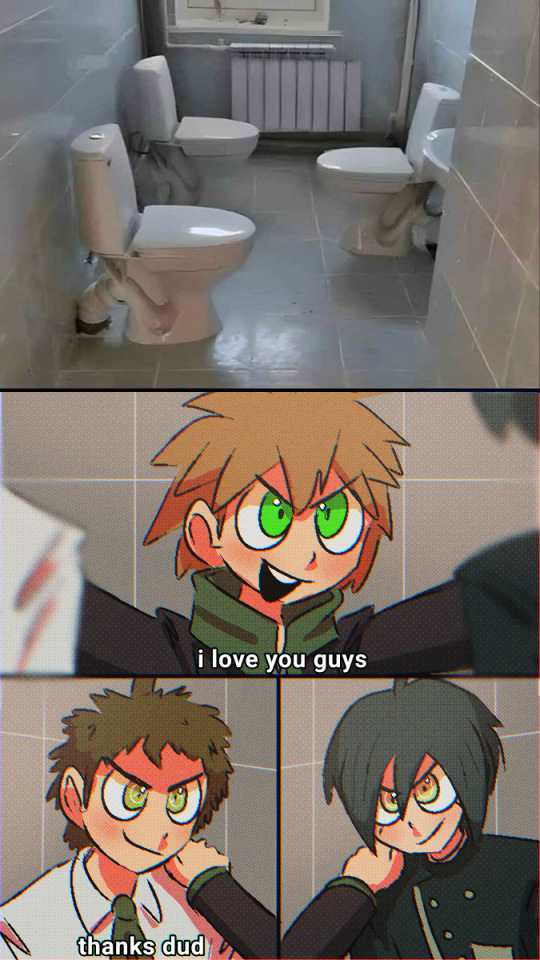
3K notes
·
View notes
Text



(click for better quality!)
This is a fanart for "A Panel of Hope Experts" by @theamityelf, please go read it if you haven't already! It's an amazing fanfiction, 10 out of 10
(Featuring Hajime in his 'Girls Just Wanna Have SUN' t-shirt. Also, I tried a different brush for the lineart bcs I wanted it to look scratchy and unstable. A bit different from my usual style, but I feel like it suits Nagito well.)
#a panel of Hope experts#danganronpa#nagito komaeda#hajime hinata#makoto naegi#komaegi#komahinaegi#komahina
25 notes
·
View notes
Text

happy hope boy :))
(wip ig)
#makoto naegi#my art#i tried out a new painting style and I’m loving it#naegi makoto#danganronpa#dr1#trigger happy havoc#wip#art wip
80 notes
·
View notes
Text

27 notes
·
View notes